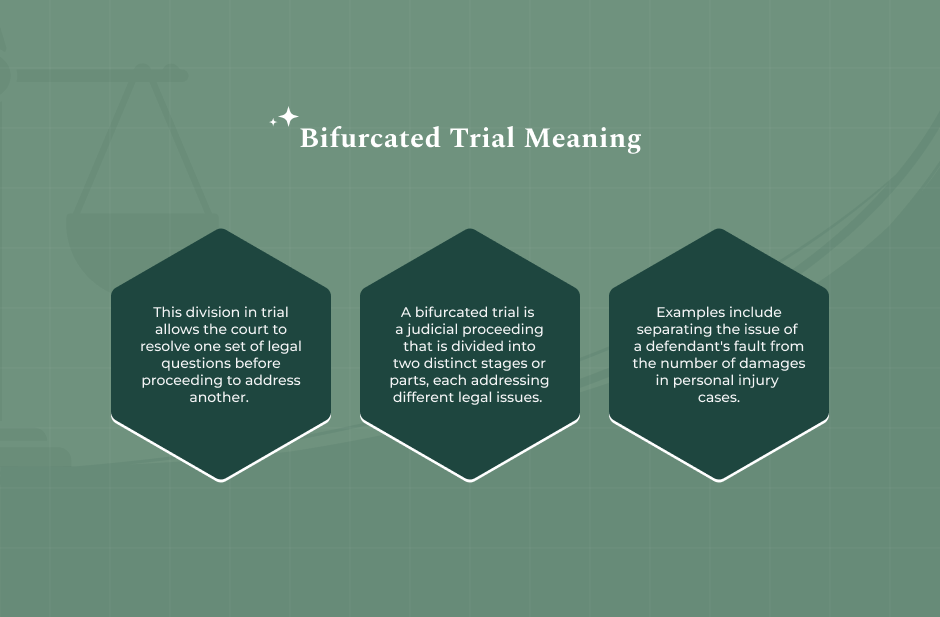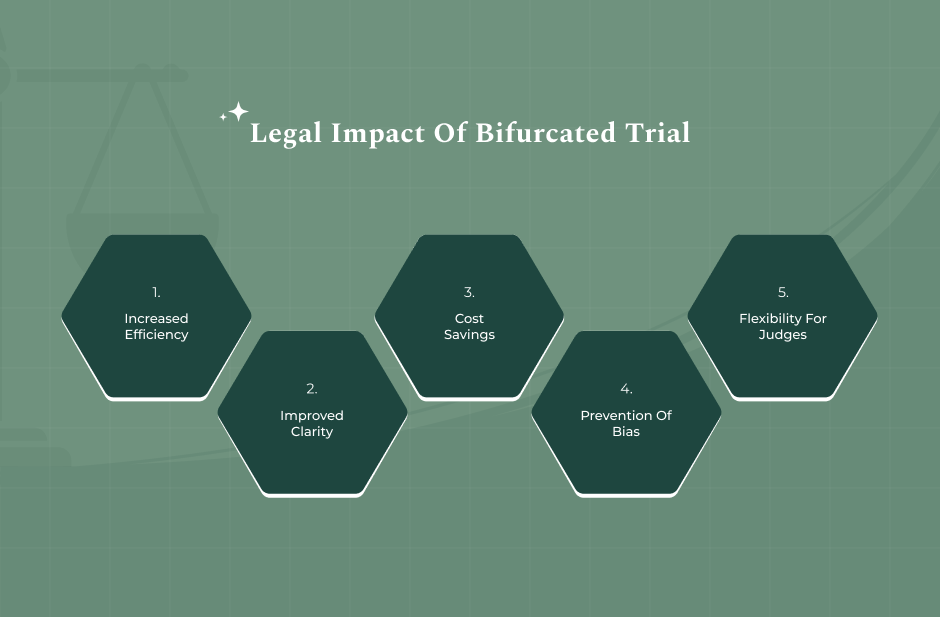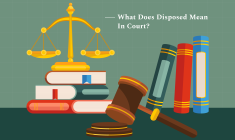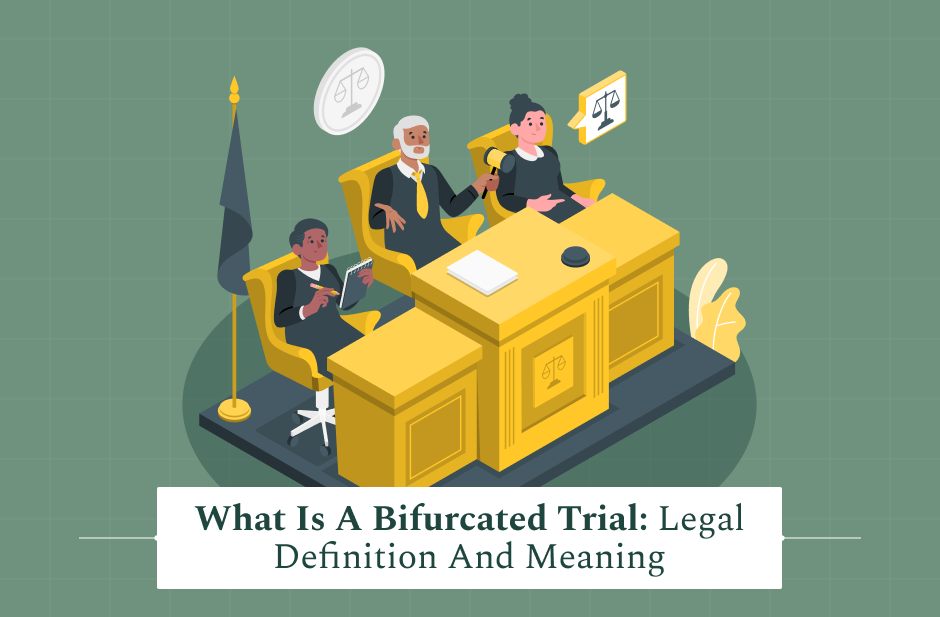Family laws are complex, and it is not just about a couple opting for a separation or divorce. It also involves the custody of the child and property settlement. Like a usual bifurcation trial, a bifurcation trial in family law also addresses the concern in two stages.
When a trial has multiple issues associated with it, addressing them together can delay the entire judgment process. A bifurcated trial streamlines the legal process, making it faster and less overwhelming.
So, suppose you are facing a pressing issue that can be addressed under the family law provision, especially in states such as California. In that case, you need to understand the bifurcated trial meaning, the types of bifurcated trials, the key aspects of a bifurcated trial, and more.
What Is A Bifurcated Trial In Family Law?

The bifurcated trial definition in family law refers to a trial when the court addresses two different aspects of the case at two different times. To clarify further, a trial always has a more pressing or urgent issue and some related affairs.
For example, when a couple is looking for a divorce, deciding on the marital status is more important, and other matters, such as the custody of the child, can be taken up later.
The bifurcation of the trial can be requested by either party or the parties concerned. Furthermore, the court can propose a bifurcation if deemed fit.
What Are The Types Of Bifurcated Trials?
Bifurcated trials are not just limited to trials under the family laws. Many types of civic and criminal cases can have bifurcated trials. Here are the details.
Civil Cases Involving Liability And Damages
A bifurcation trial is most common in civil cases. The first phase of the trial determines whether the defendant is responsible for the damage or harm to the plaintiff.
If the first phase of the trial thinks that the defendant is liable, then the second phase of the bifurcation trial will determine how much compensation they will pay to the plaintiff.
Criminal Cases Where Sentencing And Guilt Are Involved
Major criminal cases, where the sentencing is severe, especially when capital sentencing is involved, often benefit from bifurcation. Here, the first phase of the bifurcation trail decides whether the person concerned is guilty or not.
If the guilt is proven, the later phase of the trial further allows for presenting evidence and mitigating the severity of the action, as well as determining the punishment.
In this context, we can refer to the Gregg v. Georgia (1976) trial. The Furman decision in the case was an astounding “yes” for capital punishment, with a 7-2 vote. However, the State of Georgia employed a bifurcated method for the trial, and in the second phase of the case, the Supreme Court withheld the death penalty.
In fact, the Supreme Court came up with a narrower guideline for the execution of capital punishments. It has been a landmark case in understanding the importance of bifurcation trials in capital punishment, and later, many states adopted this bifurcation method.
Legal And Equitable Claims
A single case may involve both legal and equitable issues. So, certain aspects of these cases are to be intervened by a judge, while others necessitate a jury’s consideration.
The bifurcation method helps to address and resolve these issues more conveniently.
Jurisdictional Vs. Merits Cases
Each case has two important aspects. The first one is the jurisdiction, meaning the specific police station or cop who will be taking charge of the case.
On the other hand, every case has a merit, meaning the substance or the legal provision of the issue. With bifurcation, these two issues can be decided separately.
Divorce Cases
Of course, as mentioned, a bifurcation trial is very common in divorce cases. It is especially important when the dissolution of the marriage needs to happen immediately.
Other important aspects of the case, such as the division of the property or the custody of the child, can be dealt with later.
What Are The Key Aspects Of A Bifurcated Trial?
A bifurcated trial makes the judgments more objective, and it allows the jury to have more clarity about the cases. Let’s know more about the aspects of a bifurcated trial.
Less Prejudice
In civil cases of liability and damages or punitive cases, bifurcation helps to maintain objectivity.
To explain further, suppose a judge finds you liable for damage. They will not know your financial condition when pleading you liable or guilty.
Your financial condition will only be discussed at a later stage of the case.
More Objective Addressal Of Issues In Two Different Stages
In a civic or criminal case, there are two important elements. First, you have to address the guilt or liability. Then comes the second element, which is the sentence for compensation or punishment.
Now, in a bifurcation trail, these two elements are dealt with in two separate phases. So, even if the crime or liability is proved, the defendant can always mitigate some amount of punishment if deemed fit by the court.
Clarity For The Jury
In a bifurcated trial, the jury can focus better on the evidence. The related but not-so-important issues here do not majorly impact the merit or outcome of the case.
Also, very specific agendas in each phase of the case, the jury has a specific set of questions to address, and thus, they can avoid confusion.
Faster Disposal
Bifurcation makes the legal process more streamlined, and it optimizes the resources and time. For example, suppose you are the defendant in a liability case and you are not guilty.
Then, the second phase of the trial will not take place.
How Does A Bifurcated Trial Happen? Understanding The Bifurcated Trial Process
Here is a step-by-step guide on how a bifurcation trial will work.
At the first stage, you will appeal before the court, or the court will initiate a bifurcation for cases that demand expedition.
Then, the first hearing will happen. In this hearing, only that part of the case which needs quick disposal will be addressed. For example, in a divorce case, the reconciliation order or divorce decree will typically happen during the first session.
In the second hearing, the court will address other issues, such as the custody of the child and the division of property.
Read Also: Understanding Bail Forfeiture In The USA: Legal Implications, Procedures, And Remedies
What Are The Legal Impacts Of A Bifurcated Trial?

The legal impacts of a bifurcated trial, of course, involve a faster and more objective disposal of a case. However, beyond the legal implications, a bifurcated trial has positive financial and emotional impacts.
For example, a bifurcated trial, bringing quick results, can help the parties to sort complex financial affairs such as tax filing.
On the other hand, when a divorce process is expedited through the bifurcation method, the parties can enjoy emotional relief with a sense of closure.
Bifurcated Trial: Frequently Asked Questions (FAQs):
Here are frequently asked questions and answers about a bifurcated trial.
Yes, in legal terms, bifurcation often refers to the process of divorce. However, when a bifurcation refers to a divorce, it means that the decree on the marital status has been issued.
However, more related issues, such as child custody and property divisions, are not resolved yet.
The benefits of a bifurcation trial involve faster and more efficient disposal of a case by dividing the issues into two separate sections.
Furthermore, it helps to save resources and gives the jury more clarity about the trial.
One of the biggest disadvantages of a bifurcated trial is the inconsistency of ruling in two different phases of a case. Thus, there can be conflicts and confusion, making the parties rush to the court again.
Also, in bifurcated cases, the plaintiffs and lawyers cannot present the humanitarian side of the case.
















